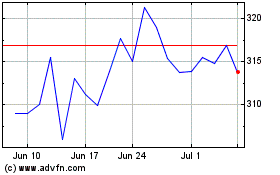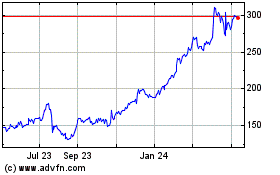Spotify Files EU Antitrust Complaint Over Apple's App Store -- 2nd Update
March 13 2019 - 7:50AM
Dow Jones News
By Valentina Pop in Brussels and Sam Schechner in Paris
Music-streaming service Spotify Technology SA has filed an
antitrust complaint in Europe against Apple Inc., a new salvo in
the broader battle over how and whether to rein in alleged
wrongdoing by tech giants.
Spotify's complaint, filed late Monday to the antitrust arm of
the European Union, alleges that Apple in recent years has abused
its control over which apps appear in its App Store. The
restrictions, Spotify claims, are designed to restrict
music-streaming services that compete with Apple's own Apple
Music.
Spotify claims that Apple made it difficult for rival
subscription services to market themselves to users without using
Apple's payment system, which generally takes a 30% cut of
transactions. Spotify's app doesn't face the same restrictions on
in the Play store run by Alphabet Inc.'s Google, Spotify said.
Spotify also said Apple at times rejected security updates of its
app and threatened to kick it out of its App Store for allegedly
anticompetitive reasons.
"Apps should compete on merits, not who owns the app store,"
said Horacio Gutierrez, Spotify's general counsel.
Apple didn't immediately respond to a request for comment.
A spokesman for the European Commission, the EU's antitrust
enforcer, confirmed that they received the Spotify complaint "which
we are assessing under our standard procedures."
Spotify's complaint -- the first official one made public at the
EU level about Apple's App Store -- escalates the global battle
over how to regulate tech giants on topics ranging from privacy and
taxation to hate speech and competition.
The European Commission in 2016 ordered Apple to repay $14.5
billion in tax breaks to Ireland, a decision that earned
competition commissioner Margrethe Vestager the nickname "tax lady"
from President Trump. In following years, the commission slapped
Google with record fines totaling $7.7 billion in 2017 and 2018 for
alleged anticompetitive behavior, has implemented a strict new
privacy law that has spawned many investigations and is close to
approving new copyright rules aimed at making tech giants pay more
money to music companies and news organizations.
Underpinning many of these battles is a central question: What
responsibilities should be placed on companies that serve millions
of businesses and billions of consumers with services that some
contend are essential?
Some activists and politicians on both sides of the Atlantic
argue that big tech companies have become like utilities, and
should be regulated as such. Sen. Elizabeth Warren, the
Massachusetts Democrat running for president, went further last
week, calling for companies like Amazon.com Inc. and Facebook Inc.
to be broken up.
One major subject of debate is what obligations should be placed
on companies that operate platforms used by thousands of other
businesses. The EU, for instance, last year said it was opening a
preliminary probe into whether Amazon is unfairly competing against
merchants that sell goods via its online-retail platform. The EU
also is close to approving new regulation that would mandate that
online platforms be more transparent and predictable in the terms
they offer companies that rely on them.
The U.K. government on Wednesday published a report from a
government-appointed panel recommending tighter antitrust oversight
of big tech firms, also highlighting the issue.
It isn't clear what the EU will do with the complaint from
Spotify, one of Europe's biggest recent tech successes. The current
European Commission will reach the end of its term later this year,
following parliament elections in May, leaving little time to make
significant progress on a new investigation. Spotify has also
complained informally to the EU several times about similar issues
in recent years.
In late 2017, for instance, the company and other streaming
firms sent the EU a letter complaining about the behavior of both
Apple and Alphabet Inc.'s Google, which runs the Play store for
apps that run on Android devices. Spotify didn't rule out pursuing
the issue in the U.S., too.
Deezer, another music streaming firm that complained in 2017, on
Wednesday said they supported Spotify in their antitrust challenge
and that they looked forward to the commission's response.
A spokesman for Google didn't immediately respond to a request
for comment.
In a blog post published Wednesday, Spotify Chief Executive
Daniel Ek contended that Apple's rules "purposely limit choice and
stifle innovation at the expense of the user experience --
essentially acting as both a player and referee to deliberately
disadvantage other app developers."
As part of its complaint, Spotify alleges that Apple created a
series of what it claims were unjustified or arbitrary obstacles
for rivals to favor its own Apple Music service.
"Once Apple became not only a platform provider, but also a
direct competitor, their incentive to disadvantage rival services,
like Spotify, became even greater and their restrictions started to
become more frequent and extreme," Mr. Gutierrez, the general
counsel, said.
Anne Steele
contributed to this article.
Write to Valentina Pop at valentina.pop@wsj.com and Sam
Schechner at sam.schechner@wsj.com
(END) Dow Jones Newswires
March 13, 2019 07:35 ET (11:35 GMT)
Copyright (c) 2019 Dow Jones & Company, Inc.
Spotify Technology (NYSE:SPOT)
Historical Stock Chart
From Mar 2024 to Apr 2024

Spotify Technology (NYSE:SPOT)
Historical Stock Chart
From Apr 2023 to Apr 2024
